Delphi Complete Works of Aeschylus (Illustrated) (Delphi Ancient Classics) Read online
Page 2
CHORUS
A mine of treasure in the earth, a fount of silver ore!
ATOSSA
Is it in skill of bow and shaft that Athens’ men excel?
CHORUS
Nay, they bear bucklers in the fight,
and thrust the spear-point well.
ATOSSA
And who is shepherd of their host and holds them in command?
CHORUS
To no man do they bow as slaves, nor own a master’s hand.
ATOSSA
How should they bide our brunt of war, the East upon the West?
CHORUS
That could Darius’ valiant horde in days of yore attest!
ATOSSA
A boding word, to us who bore the men now far away!
CHORUS
Nay — as I deem, the very truth will dawn on us to-day.
A Persian by his garb and speed, a courier draws anear —
He bringeth news, of good or ill, for Persia’s land to hear.
[Enter A MESSENGER.
MESSENGER
O walls and towers of all the Asian realm,
O Persian land, O treasure-house of gold!
How, by one stroke, down to destruction, down,
Hath sunk our pride, and all the flower of war
That once was Persia’s, lieth in the dust!
Woe on the man who first announceth woe —
Yet must I all the tale of death unroll!
Hark to me, Persians! Persia’s host lies low.
CHORUS
O ruin manifold, and woe, and fear!
Let the wild tears run down, for the great doom is here!
MESSENGER
This blow hath fallen, to the utterance, And I, past hope, behold
my safe return!
CHORUS
Too long, alack, too long this life of mine,
That in mine age I see this sudden woe condign!
MESSENGER
As one who saw, by no loose rumour led,
Lords, I would tell what doom was dealt to us.
CHORUS
Alack, how vainly have they striven!
Our myriad hordes with shaft and bow
Went from the Eastland, to lay low
Hellas, beloved of Heaven!
MESSENGER
Piled with men dead, yea, miserably slain,
Is every beach, each reef of Salamis!
CHORUS
Thou sayest sooth — ah well-a-day!
Battered amid the waves, and torn,
On surges hither, thither, borne,
Dead bodies, bloodstained and forlorn,
In their long cloaks they toss and stray!
MESSENGER
Their bows availed not! all have perished, all,
By charging galleys crushed and whelmed in death.
CHORUS
Shriek out your sorrow’s wistful wail!
To their untimely doom they went;
Ill strove they, and to no avail,
And minished is their armament!
MESSENGER
Out on thee, hateful name of Salamis,
Out upon Athens, mournful memory!
CHORUS
Woe upon this day’s evil fame!
Thou, Athens, art our murderess;
Alack, full many a Persian dame
Is left forlorn and husbandless!
ATOSSA
Mute have I been awhile, and overwrought
At this great sorrow, for it passeth speech,
And passeth all desire to ask of it.
Yet if the gods send evils, men must bear.
(To the MESSENGER)
Unroll the record! stand composed and tell,
Although thy heart be groaning inwardly,
Who hath escaped, and, of our leaders, whom
Have we to weep? what chieftains in the van
Stood, sank, and died and left us leaderless?
MESSENGER
Xerxes himself survives and sees the day.
ATOSSA
Then to my line thy word renews the dawn
And golden dayspring after gloom of night!
MESSENGER
But the brave marshal of ten thousand horse,
Artembares, is tossed and flung in death
Along the rugged rocks Silenian.
And Dadaces no longer leads his troop,
But, smitten by the spear, from off the prow
Hath lightly leaped to death; and Tenagon,
In true descent a Bactrian nobly born,
Drifts by the sea-lashed reefs of Salamis,
The isle of Ajax. Gone Lilaeus too,
Gone are Arsames and Argestes! all,
Around the islet where the sea-doves breed,
Dashed their defeated heads on iron rocks;
Arcteus, who dwelt beside the founts of Nile,
Adeues, Pheresseues, and with them
Pharnuchus, from one galley’s deck went down.
Matallus, too, of Chrysa, lord and king
Of myriad hordes, who led unto the fight
Three times ten thousand swarthy cavaliers,
Fell, with his swarthy and abundant beard
Incarnadined to red, a crimson stain
Outrivalling the purple of the sea!
There Magian Arabus and Artames
Of Bactra perished — taking up, alike,
In yonder stony land their long sojourn.
Amistris too, and he whose strenuous spear
Was foremost in the fight, Amphistreus fell,
And gallant Ariomardus, by whose death
Broods sorrow upon Sardis: Mysia mourns
For Seisames, and Tharubis lies low —
Commander, he, of five times fifty ships,
Born in Lyrnessus: his heroic form
Is low in death, ungraced with sepulchre.
Dead too is he, the lord of courage high,
Cilicia’s marshal, brave Syennesis,
Than whom none dealt more carnage on the foe,
Nor perished by a more heroic end.
So fell the brave: so speak I of their doom,
Summing in brief the fate of myriads!
ATOSSA
Ah well-a-day! these crowning woes I hear,
The shame of Persia and her shrieks of dole!
But yet renew the tale, repeat thy words,
Tell o’er the count of those Hellenic ships,
And how they ventured with their beakèd prows
To charge upon the Persian armament.
MESSENGER
Know, if mere count of ships could win the day,
The Persians had prevailed. The Greeks, in sooth,
Had but three hundred galleys at the most,
And other ten, select and separate.
But — I am witness — Xerxes held command
Of full a thousand keels, and, those apart,
Two hundred more, and seven, for speed renowned! —
So stands the reckoning, and who shall dare
To say we Persians had the lesser host?
ATOSSA
Nay, we were worsted by an unseen power
Who swayed the balance downward to our doom!
MESSENGER
In ward of heaven doth Pallas’ city stand.
ATOSSA
How then? is Athens yet inviolate?
MESSENGER
While her men live, her bulwark standeth firm!
ATOSSA
Say, how began the struggle of the ships?
Who first joined issue? did the Greeks attack,
Or Xerxes, in his numbers confident?
MESSENGER
O queen, our whole disaster thus befell,
Through intervention of some fiend or fate —
I know not what — that had ill will to us.
From the Athenian host some Greek came o’er,
To thy son Xerxes whispering this tale —
Once let the gloom of night have gathered in,
The Greeks will tarry not, but swiftly spring
Each to his galley-bench, in furtive flight,
Softly contriving safety for their life.
Thy son believed the word and missed the craft
Of that Greek foeman, and the spite of Heaven,
And straight to all his captains gave this charge —
As soon as sunlight warms the ground no more,
And gloom enwraps the sanctuary of sky,
Range we our fleet in triple serried lines
To bar the passage from the seething strait,
This way and that: let other ships surround
The isle of Ajax, with this warning word —
That if the Greeks their jeopardy should scape
By wary craft, and win their ships a road.
Each Persian captain shall his failure pay
By forfeit of his head. So spake the king,
Inspired at heart with over-confidence,
Unwitting of the gods’ predestined will.
Thereon our crews, with no disordered haste,
Did service to his bidding and purveyed
The meal of afternoon: each rower then
Over the fitted rowlock looped his oar.
Then, when the splendour of the sun had set,
And night drew on, each master of the oar
And each armed warrior straightway went aboard.
Forward the long ships moved, rank cheering rank,
Each forward set upon its ordered course.
And all night long the captains of the fleet
Kept their crews moving up and down the strait.
So the night waned, and not one Grecian ship
Made effort to elude and slip away.
But as dawn came and with her coursers white
Shone in fair radiance over all the earth,
First from the Grecian fleet rang out a cry,
A song of onset! and the island crags
Re-echoed to the shrill exulting sound.
Then on us Eastern men amazement fell
And fear in place of hope; for what we heard
Was not a call to flight! the Greeks rang out
Their holy, resolute, exulting chant,
Like men come forth to dare and do and die
Their trumpets pealed, and fire was in that sound,
And with the dash of simultaneous oars
Replying to the war-chant, on they came,
Smiting the swirling brine, and in a trice
They flashed upon the vision of the foe!
The right wing first in orderly advance
Came on, a steady column; following then,
The rest of their array moved out and on,
And to our ears there came a burst of sound,
A clamour manifold. — On, sons of Greece!
On, for your country’s freedom! strike to save
Wives, children, temples of ancestral gods,
Graves of your fathers! now is all at stake.
Then from our side swelled up the mingled din
Of Persian tongues, and time brooked no delay —
Ship into ship drave hard its brazen beak
With speed of thought, a shattering blow! and first
One Grecian bark plunged straight, and sheared away
Bowsprit and stem of a Phoenician ship.
And then each galley on some other’s prow
Came crashing in. Awhile our stream of ships
Held onward, till within the narrowing creek
Our jostling vessels were together driven,
And none could aid another: each on each
Drave hard their brazen beaks, or brake away
The oar-banks of each other, stem to stern,
While the Greek galleys, with no lack of skill,
Hemmed them and battered in their sides, and soon
The hulls rolled over, and the sea was hid,
Crowded with wrecks and butchery of men.
No beach nor reef but was with corpses strewn,
And every keel of our barbarian host
Hurried to flee, in utter disarray.
Thereon the foe closed in upon the wrecks
And hacked and hewed, with oars and splintered planks,
As fishermen hack tunnies or a cast
Of netted dolphins, and the briny sea
Rang with the screams and shrieks of dying men,
Until the night’s dark aspect hid the scene.
Had I a ten days’ time to sum that count
Of carnage, ‘twere too little! know this well —
One day ne’er saw such myriad forms of death!
ATOSSA
Woe on us, woe! disaster’s mighty sea
Hath burst on us and all the Persian realm!
MESSENGER
Be well assured, the tale is but begun —
The further agony that on us fell
Doth twice outweigh the sufferings I have told!
ATOSSA
Nay, what disaster could be worse than this?
Say on! what woe upon the army came,
Swaying the scale to a yet further fall?
MESSENGER
The very flower and crown of Persia’s race,
Gallant of soul and glorious in descent,
And highest held in trust before the king,
Lies shamefully and miserably slain.
ATOSSA
Alas for me and for this ruin, friends!
Dead, sayest thou? by what fate overthrown?
MESSENGER
An islet is there, fronting Salamis —
Strait, and with evil anchorage: thereon
Pan treads the measure of the dance he loves
Along the sea-beach. Thither the king sent
His noblest, that, whene’er the Grecian foe
Should ‘scape, with shattered ships, unto the isle,
We might make easy prey of fugitives
And slay them there, and from the washing tides
Rescue our friends. It fell out otherwise
Than he divined, for when, by aid of Heaven,
The Hellenes held the victory on the sea,
Their sailors then and there begirt themselves
With brazen mail and bounded from their ships,
And then enringed the islet, point by point,
So that our Persians in bewilderment
Knew not which way to turn. On every side,
Battered with stones, they fell, while arrows flew
From many a string, and smote them to the death.
Then, at the last, with simultaneous rush
The foe came bursting on us, hacked and hewed
To fragments all that miserable band,
Till not a soul of them was left alive.
Then Xerxes saw disaster’s depth, and shrieked,
From where he sat on high, surveying all —
A lofty eminence, beside the brine,
Whence all his armament lay clear in view.
His robe he rent, with loud and bitter wail,
And to his land-force swiftly gave command
And fled, with shame beside him! Now, lament
That second woe, upon the first imposed!
ATOSSA
Out on thee, Fortune! thou hast foiled the hope
And power of Persia: to this bitter end
My son went forth to wreak his great revenge
On famous Athens! all too few they seemed,
Our men who died upon the Fennel-field!
Vengeance for them my son had mind to take,
And drew on his own head these whelming woes.
But thou, say on! the ships that ‘scaped from wreck —
Where didst thou leave them? make thy story clear.
MESSENGER
The captains of the ships that still survived
Fled in disorder, scudding down the wind,
The while our land-force on Boeotian soil
Fell into ruin, some beside the springs
Dropping before they drank, and some outworn,
Pursued, and panting all their life away.
The rest of us our way to Phocis won,
And thence to Doris and the Melian gulf,
Where with soft stream Spercheus laves the soil.
Thence to the northward did Phthiotis’ plain,
And some Thessalian fortress, lend us aid,
For famine-pinched we were, and many died
Of drought and hunger’s twofold present scourge.
Thence to Magnesia came we, and the land
Where Macedonians dwell, and crossed the ford
Of Axius, and Bolbe’s reedy fen,
And mount Pangaeus, in Edonian land.
There, in the very night we came, the god
Brought winter ere its time, from bank to bank
Freezing the holy Strymon’s tide. Each man
Who heretofore held lightly of the gods,
Now crouched and proffered prayer to Earth and Heaven!
Then, after many orisons performed,
The army ventured on the frozen ford:
Yet only those who crossed before the sun
Shed its warm rays, won to the farther side.
For soon the fervour of the glowing orb
Did with its keen rays pierce the ice-bound stream,
And men sank through and thrust each other down —
Best was his lot whose breath was stifled first!
But all who struggled through and gained the bank,
Toilfully wending through the land of Thrace
Have made their way, a sorry, scanted few,
Unto this homeland. Let the city now
Lament and yearn for all the loved and lost.
My tale is truth, yet much untold remains
Of ills that Heaven hath hurled upon our land.
CHORUS
Spirit of Fate, too heavy were thy feet,
Those ill to match! that sprang on Persia’s realm.
ATOSSA
Woe for the host, to wrack and ruin hurled!
O warning of the night, prophetic dream!
Thou didst foreshadow clearly all the doom,
While ye, old men, made light of woman’s fears!
Ah well — yet, as your divination ruled
The meaning of the sign, I hold it good,
First, that I put up prayer unto the gods,
And, after that, forth from my palace bring
The sacrificial cake, the offering due
To Earth and to the spirits of the dead.
Too well I know it is a timeless rite
Over a finished thing that cannot change!
But yet — I know not — there may come of it
Alleviation for the after time.
You it beseems, in view of what hath happed,
T’ advise with loyal hearts our loyal guards:
And to my son — if, ere my coming forth,
He should draw hitherward — give comfort meet,
Escort him to the palace in all state,
Lest to these woes he add another woe!

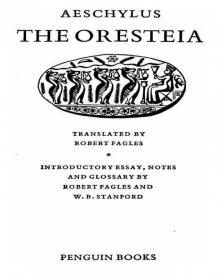 The Oresteia: Agamemnon, the Libation Bearers, the Eumenides
The Oresteia: Agamemnon, the Libation Bearers, the Eumenides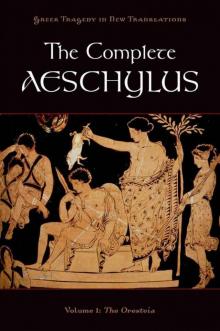 The Complete Aeschylus, Volume I: The Oresteia
The Complete Aeschylus, Volume I: The Oresteia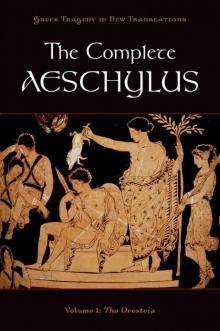 The Complete Aeschylus - Volume I: The Oresteia
The Complete Aeschylus - Volume I: The Oresteia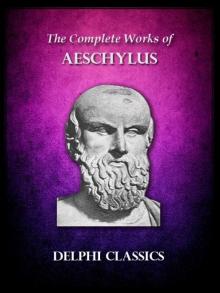 Delphi Complete Works of Aeschylus (Illustrated) (Delphi Ancient Classics)
Delphi Complete Works of Aeschylus (Illustrated) (Delphi Ancient Classics)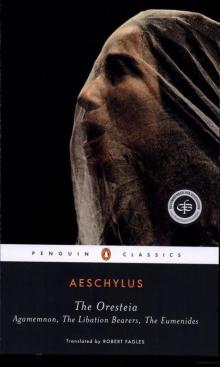 The Oresteia: Agamemnon, the Libation-Bearers & the Furies
The Oresteia: Agamemnon, the Libation-Bearers & the Furies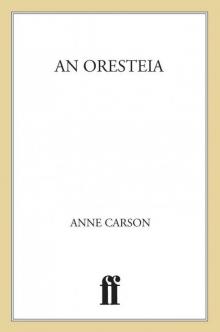 An Oresteia: Agamemnon by Aiskhylos; Elektra by Sophokles; Orestes by Euripides
An Oresteia: Agamemnon by Aiskhylos; Elektra by Sophokles; Orestes by Euripides